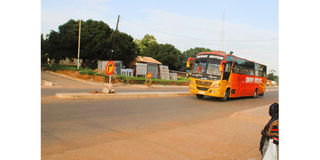Govt borrows Shs1.1t to upgrade national roads

A bus travels on Atiak-Laropi road in Adjumani District on May 6, 2024. PHOTO | MARKO TAIBOT
What you need to know:
- The government has also borrowed another Shs450m from Standard Chartered Bank to finance the 115 km Kitgum-Kidepo road connecting Kitgum and Kaabong districts.
The government has borrowed some $295 million (about Shs1.1 trillion) to largely finance upgrading of national roads in the next financial year that begins in July.
Finance minister Matia Kasaija and Dr Muhammad Al Jassar, the president of Islamic Development Bank Group, signed the deal in Riyadh, Saudi Arabia. The duo signed the concessional loan during the 2024 Islamic Development Bank Group annual meeting that was held between April 27 and 30.
The Ministry of Finance said the funding will go towards the construction of the Masindi-Port Bridge where a ferry currently crosses River Nile and links Renkunye-Apac-Lira Road.
Uganda easily got the loan because it is a member of the Organisation of Islamic Countries (OIC) . The country joined OIC during the late President Idi Amin’s regime in the 1970s.
Upon signing the deal, Minister Kasaija pledged that the government “shall fulfill its obligations under the agreement”.
Nonetheless, national debt analysts, policy experts, and economists who Daily Monitor spoke to yesterday raised fear about the utilisation and absorption of the concessional loan, which has proven wanting in several cases over the years.
IsDB is the third largest multilateral donor to Uganda, contributing more than 20 percent support in sectors such as roads, energy and education, particularly in skills development.
But as the government was securing the aforementioned loan, back home, the Executive wing of the government was tabling another loan to be borrowed domestically.
As is often the case, Parliament approved the government request to borrow up to Euro 110,543,947.52 (about Shs450m) from Standard Chartered Bank to finance the Kitgum-Kidepo Road upgrading project. The 115 km Kitgum-Kidepo Road in north eastern Uganda connects Kitgum and Kaabong districts.
The motion for the approval was presented by the State minister for Finance in-charge of General Duties, Mr Henry Musasizi, during the plenary sitting presided over by Speaker Anita Among on April 30.
Mr Musasizi said upgrading of the road is crucial, as it will facilitate the movement of tourists visiting Kidepo Valley National Park hence promoting tourism in the country.
Public debt stock
Uganda’s public debt stood at Shs80.8 trillion, equivalent to $21.7 billion as at the end of December 2022/2023. Of this amount, external debt was Shs47.9 trillion, nearly $13 billion while domestic debt was Shs33 trillion equates to nearly $9 billion. At that time, public debt was projected at Shs88.9 trillion, which translated into $23.7 billion by June 30, 2023.
Due to rising levels of Uganda’s public debt, the experts are now more worried not just about the accumulation of the public debt stock which will require each of the 45 million Ugandans to make a one-off contribution of nearly 2 million, but also the government readiness to utilise the loan as required.
“The issue is not so much about the IsDB loan, which is offered on concessional terms, but getting a proper return on investment from the accrued borrowed money?” Ms Christine Byiringiro, a debt analyst with the Uganda Debt Network, told Daily Monitor yesterday when contacted for this story.
Mr Julius Mukunda, the executive director of CSBAG, said it is about the government’s capacity to absorb the funds once released.
He said: “For a while now, part of the problem has been the absorption of funds in many of these projects. And for that, I am skeptical until the government proves otherwise. ”
Meanwhile, Mr David Walakira, the executive director of the Centre for Budget and Tax Policy (CBTP), said it is about time the government “cut its coat according to its cloth”, arguing that he who bites more than he can chew will soon fall into trouble and find himself in a difficult situation than already is the case.
This is because the government’s domestic revenue targets for financial year 2023/2024 amounting to nearly Shs30 trillion are not only under threat of not hitting the target but there is also the need to fill the gap left by the World Bank, whose contribution towards budget support will be dearly missed.
On August 8, 2023, the World Bank Group released a statement on Uganda after the Parliament passed the Anti-Homosexuality Act, 2023, which the institution said fundamentally contradicts the group’s values. It noted that there will be no new public financing to Uganda that will be presented to “our board of executive directors until the efficacy of the additional measures has been tested”.
Government weighs in
Even in the wake of the World Bank situation, the Deputy Secretary to the Treasury, Mr Patrick Ocailap, said the government will maintain debt sustainability by limiting non-concessional debt to high-impact, high-return projects such as infrastructural projects that the IsDB funds are geared towards.
He said IsDB is a multilateral lender whose repayment period is normally longer, for example, 30 years and in some instances more, and on an interest rate of about 0.5 compared to non-concessional lenders.





